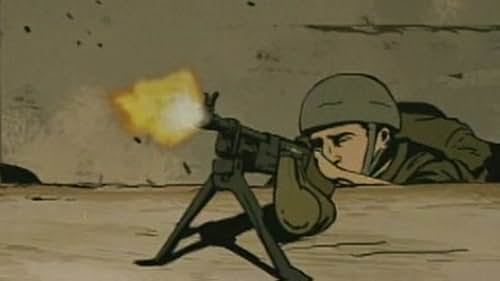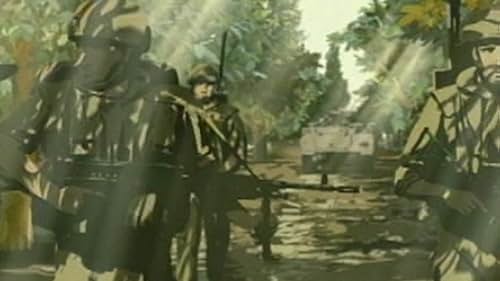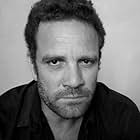An Israeli film director interviews fellow veterans of the 1982 invasion of Lebanon to reconstruct his own memories of his term of service in that conflict.An Israeli film director interviews fellow veterans of the 1982 invasion of Lebanon to reconstruct his own memories of his term of service in that conflict.An Israeli film director interviews fellow veterans of the 1982 invasion of Lebanon to reconstruct his own memories of his term of service in that conflict.
- Nominated for 1 Oscar
- 46 wins & 63 nominations total
Ari Folman
- Self
- (voice)
Ori Sivan
- Self - Interviewee
- (voice)
Zahava Solomon
- Self - Interviewee
- (voice)
- (as Prof. Zahava Solomon)
Miki Leon
- Boaz Rein-Buskila
- (voice)
Yehezkel Lazarov
- Carmi Cna'an
- (voice)
- Director
- Writer
- All cast & crew
- Production, box office & more at IMDbPro
Storyline
Did you know
- TriviaThe first animated film to be nominated for Best Foreign Language Film Oscar.
- GoofsThe narrator refers to the transport helicopter as a "Hercules helicopter", which is a confusion of the C-130 Hercules cargo plane with the CH-53 Stallion helicopter, the latter being the true transportation device.
- Quotes
Anonymous soldier: What to do? What to do? Why don't you tell us what to do?
Ari Folman: Shoot!
Anonymous soldier: On who?
Ari Folman: How should I know on who? Just shoot!
Anonymous soldier: Isn't it better to pray?
Ari Folman: Pray and shoot!
- ConnectionsFeatured in Golden Globe Awards (2009)
Featured review
Although I saw it last night I am still unsure of my reaction to "Waltz with Bashir". I'm still digesting the film, attempting to understand more about it, still wondering if I found it remarkable or disappointing, if I thought its moral sensibilities were sound or superficially apologetic. Perhaps the ultimate irony in the film is that its main themes are those of willful ignorance and of amnesia, or willing repression of memories by the Israeli soldiers on whom the film focuses, but, as pointed out by the great film critic Joumane Chahine (who loved the film) in Film Comment: "It's not that Folman minimizes Israel's complicity in the events, the IDF's logistical involvement has long been a matter of record... The film's more individual perspective justifies circumventing the matter. But the film's discreet arrogance is that, in contrast, it confronts head-on the brutality of the Lebanese Christian Phalanges who perpetrated the butchery. And while the Arabs' treatment of their Palestinian 'brethren' has hardly been exemplary, there is something particularly distasteful- somehow akin to watching a German film about Vichy France's treatment of Jews during World War II- about being lectured on this by the Israelis."
I did find this attitude highly ironic. The Israeli soldiers, the men he actually knew, are all, bar none (except for defence minister Ariel Sharon, who unquestionably was responsible at least in part for the proved massacre of anywhere between two to three and half thousand civilians of all ages and genders, and his presence also ties in with the theme of amnesia- after the massacre hundreds of thousands of Israelis took to the streets in protest of the IDF's involvement thanks to Sharon's decisions, but many years later they allowed him to become Prime Minister), sweet, good, morally perfect people. Yet the Christians are portrayed almost literally as dogs. Inhuman, brutal, violent, sick, and fetishistic with regard to their leader. The film makes a huge deal about the dead children and older men and women the soldiers saw in the camps, but Ari Folman doesn't even seem to think about the women, children, and seniors killed in air strikes and even ground initiatives by the IDF during the same war. Somehow, only what the Arab Christians did is truly horrifying. A little hypocrisy at play, or is it a matter of even more suppressed memories?
All that said, I still found the film affecting, and its technical merits are unquestionably outstanding. The animation is gorgeous, the music even more special, and the film is a remarkable, rare exploration of how the guilt and pain these men feel to this day haunts them. It's not new subject matter, but the specifics of this film make it unique, that it focuses on the IDF's involvement in one of the most heinous massacres of the late twentieth century, and moreover that it focuses on involvement by young men who wouldn't have even been sure of what exactly was happening. The film's psychoanalytic approach (it is an 'animated documentary', but I suspect much of it was written, although I'm sure those interviewed were definitely quoted truthfully at many points, but what they say is a little too conveniently attached to the film's themes) is not always successful, and sometimes painfully obvious and tired ("You weren't thinking of these camps, but those camps" or "Unwillingly, you had stepped into the shoes of a Nazi"). Still, the imagery and music, as well as the genuine sincerity and honesty of the film (as well as its subjectivity) make it worthwhile viewing. It's extremely well-crafted and for the most part psychologically interesting, that much is for sure. It's also worth noting that the controversial ending worked for this viewer. Not cheap, not exploitative, but only a stark, brutal reminder of just how real it was.
I did find this attitude highly ironic. The Israeli soldiers, the men he actually knew, are all, bar none (except for defence minister Ariel Sharon, who unquestionably was responsible at least in part for the proved massacre of anywhere between two to three and half thousand civilians of all ages and genders, and his presence also ties in with the theme of amnesia- after the massacre hundreds of thousands of Israelis took to the streets in protest of the IDF's involvement thanks to Sharon's decisions, but many years later they allowed him to become Prime Minister), sweet, good, morally perfect people. Yet the Christians are portrayed almost literally as dogs. Inhuman, brutal, violent, sick, and fetishistic with regard to their leader. The film makes a huge deal about the dead children and older men and women the soldiers saw in the camps, but Ari Folman doesn't even seem to think about the women, children, and seniors killed in air strikes and even ground initiatives by the IDF during the same war. Somehow, only what the Arab Christians did is truly horrifying. A little hypocrisy at play, or is it a matter of even more suppressed memories?
All that said, I still found the film affecting, and its technical merits are unquestionably outstanding. The animation is gorgeous, the music even more special, and the film is a remarkable, rare exploration of how the guilt and pain these men feel to this day haunts them. It's not new subject matter, but the specifics of this film make it unique, that it focuses on the IDF's involvement in one of the most heinous massacres of the late twentieth century, and moreover that it focuses on involvement by young men who wouldn't have even been sure of what exactly was happening. The film's psychoanalytic approach (it is an 'animated documentary', but I suspect much of it was written, although I'm sure those interviewed were definitely quoted truthfully at many points, but what they say is a little too conveniently attached to the film's themes) is not always successful, and sometimes painfully obvious and tired ("You weren't thinking of these camps, but those camps" or "Unwillingly, you had stepped into the shoes of a Nazi"). Still, the imagery and music, as well as the genuine sincerity and honesty of the film (as well as its subjectivity) make it worthwhile viewing. It's extremely well-crafted and for the most part psychologically interesting, that much is for sure. It's also worth noting that the controversial ending worked for this viewer. Not cheap, not exploitative, but only a stark, brutal reminder of just how real it was.
- ametaphysicalshark
- Jan 22, 2009
- Permalink
Details
- Release date
- Countries of origin
- Official site
- Languages
- Also known as
- Điệu Valse Của Ký Ức
- Production companies
- See more company credits at IMDbPro
Box office
- Budget
- $1,500,000 (estimated)
- Gross US & Canada
- $2,283,849
- Opening weekend US & Canada
- $50,021
- Dec 28, 2008
- Gross worldwide
- $11,179,372
- Runtime1 hour 30 minutes
- Color
- Sound mix
- Aspect ratio
- 1.85 : 1
Contribute to this page
Suggest an edit or add missing content
















